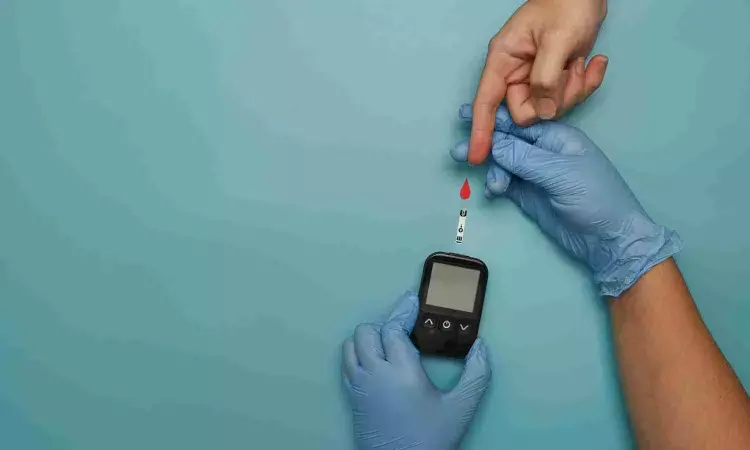- Home
- Medical news & Guidelines
- Anesthesiology
- Cardiology and CTVS
- Critical Care
- Dentistry
- Dermatology
- Diabetes and Endocrinology
- ENT
- Gastroenterology
- Medicine
- Nephrology
- Neurology
- Obstretics-Gynaecology
- Oncology
- Ophthalmology
- Orthopaedics
- Pediatrics-Neonatology
- Psychiatry
- Pulmonology
- Radiology
- Surgery
- Urology
- Laboratory Medicine
- Diet
- Nursing
- Paramedical
- Physiotherapy
- Health news
- Fact Check
- Bone Health Fact Check
- Brain Health Fact Check
- Cancer Related Fact Check
- Child Care Fact Check
- Dental and oral health fact check
- Diabetes and metabolic health fact check
- Diet and Nutrition Fact Check
- Eye and ENT Care Fact Check
- Fitness fact check
- Gut health fact check
- Heart health fact check
- Kidney health fact check
- Medical education fact check
- Men's health fact check
- Respiratory fact check
- Skin and hair care fact check
- Vaccine and Immunization fact check
- Women's health fact check
- AYUSH
- State News
- Andaman and Nicobar Islands
- Andhra Pradesh
- Arunachal Pradesh
- Assam
- Bihar
- Chandigarh
- Chattisgarh
- Dadra and Nagar Haveli
- Daman and Diu
- Delhi
- Goa
- Gujarat
- Haryana
- Himachal Pradesh
- Jammu & Kashmir
- Jharkhand
- Karnataka
- Kerala
- Ladakh
- Lakshadweep
- Madhya Pradesh
- Maharashtra
- Manipur
- Meghalaya
- Mizoram
- Nagaland
- Odisha
- Puducherry
- Punjab
- Rajasthan
- Sikkim
- Tamil Nadu
- Telangana
- Tripura
- Uttar Pradesh
- Uttrakhand
- West Bengal
- Medical Education
- Industry
Impaired Fasting Glucose and Sulfonylureas Raise Heart Risk in Inflammatory Arthritis, reveals study

Researchers have discovered in a new study that impaired fasting glucose (IFG) and sulfonylurea use are independently linked with an enhanced risk of major cardiovascular events (MACE) in inflammatory arthritis (IA) patients, including rheumatoid arthritis (RA) and psoriatic arthritis (PsA). The findings of the study underscore vigilance in screening fasting glucose level and adjusting choices of anti-diabetic therapy for patients with IA, as such patients already possess heightened cardiovascular risk. The study was conducted by Huan Meng and fellow researchers published in BMC Diabetology & Metabolic Syndrome.
This was a retrospective, population-based cohort study that made use of data available from The Hospital Authority Data Collaboration Lab in Hong Kong. Patients with IA were enrolled between January 2006 and December 2015, and follow-up data were available up to December 2018. A total of 13,905 patients were included in the study, of whom 12,233 had RA and 1,672 had PsA. Time-dependent Cox proportional hazards regression models were used by researchers to examine the relationships between fasting glucose levels, use of anti-diabetic medications, and the risk of a first MACE in this population.
Results
Among a total follow-up duration of 119,571 patient-years, 934 patients (6.7%) had their first MACE. Some differences were found between patients with and without MACE:
• 19.4% of patients with MACE had IFG (5.6–6.9 mmol/l) at baseline, compared to 15.2% of non-MACE patients (p < 0.001)
• 17.6% of the MACE patients had fasting glucose ≥ 7 mmol/l, versus 8.1% without MACE (p < 0.001)
In a subgroup analysis of anti-diabetic therapy-naïve patients, prediabetic status (IFG) independently increased the risk of MACE:
• Hazard Ratio (HR) 2.43 (95% CI 1.97–2.99) in the C-reactive protein (CRP) model
• HR 2.54 (95% CI 1.50–7.71) in the erythrocyte sedimentation rate (ESR) model
In addition, among diabetic patients, sulfonylurea use was linked with a 55% higher risk of MACE with an:
• HR of 1.55 (95% CI 1.14–2.09) after other factors that influenced the risk were controlled
Investigators concluded that impaired fasting glucose and the use of sulfonylureas separately add to the risk of major cardiovascular events. These results identify the absolute need for enhanced cardiovascular risk assessment and individually appropriate management in IA patients, especially those with abnormal glucose metabolism. More stringent fasting glucose monitoring, sulfonylurea avoidance where possible, and a preference for cardiovascular protection in therapeutic choice may diminish somewhat the large cardiovascular risk burden of this at-risk population.
Reference:
Meng, H., So, H., Lam, S.H. et al. Impaired fasting glucose and sulfonylureas increased the risk of major cardiovascular events in patients with inflammatory arthritis. Diabetol Metab Syndr 17, 132 (2025). https://doi.org/10.1186/s13098-025-01689-6
Dr Riya Dave has completed dentistry from Gujarat University in 2022. She is a dentist and accomplished medical and scientific writer known for her commitment to bridging the gap between clinical expertise and accessible healthcare information. She has been actively involved in writing blogs related to health and wellness.
Dr Kamal Kant Kohli-MBBS, DTCD- a chest specialist with more than 30 years of practice and a flair for writing clinical articles, Dr Kamal Kant Kohli joined Medical Dialogues as a Chief Editor of Medical News. Besides writing articles, as an editor, he proofreads and verifies all the medical content published on Medical Dialogues including those coming from journals, studies,medical conferences,guidelines etc. Email: drkohli@medicaldialogues.in. Contact no. 011-43720751


